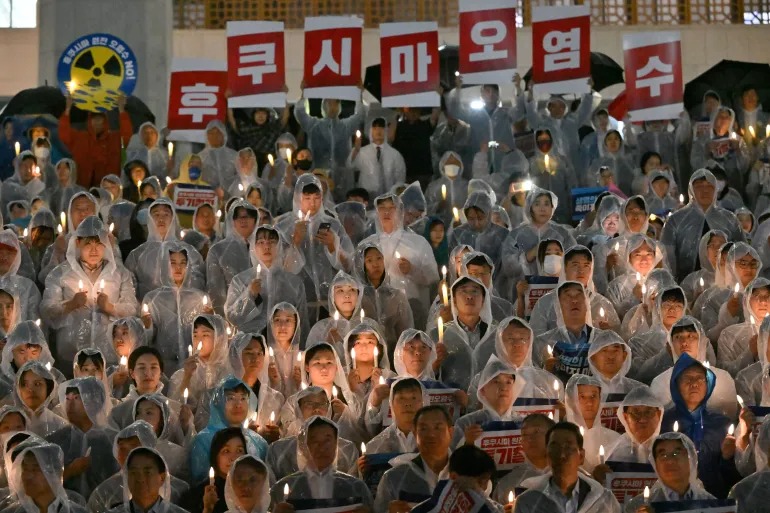In a critical step towards the decommissioning of the Fukushima nuclear power plant, Japan has initiated the release of treated radioactive water into the Pacific Ocean. This action, aimed at facilitating the cleanup of the disaster-stricken facility, has triggered a series of strong reactions both domestically and internationally. China’s immediate ban on aquatic imports from Japan has escalated tensions, while concerns over the environmental and health consequences of the release persist, leading to protests worldwide.
Fukushima’s Radioactive Water Begins Release into Pacific: China Reacts with Swift Ban
Amidst cautious preparations, the Tokyo Electric Power Company (Tepco), the operator of the Fukushima plant, set its seawater transfer pumps in motion, releasing treated radioactive water into the Pacific Ocean. The release, commencing shortly after 1pm local time, met the suitable weather and sea conditions initially announced by Tepco. However, China’s rapid response couldn’t be ignored, as the nation promptly announced a sweeping ban on all aquatic products originating from Japan.
Decommissioning Dilemma: The Complex Process of Removing Radioactive Water
The decision to release more than one million metric tonnes of treated radioactive water has been a focal point of the Fukushima decommissioning process. Stored in over a thousand tanks around the plant, this water was crucial for cooling the reactors after the devastating 2011 tsunami. As the cleanup process is anticipated to span over four decades, concerns have arisen regarding the handling of the radioactive elements present, particularly tritium. While Japan asserts that all radioactive elements, except for tritium, have been successfully filtered out, this claim has ignited skepticism and debate.
Global Backlash and Protests: Concerns Over Safety and Environmental Impact
Despite the International Atomic Energy Agency’s (IAEA) endorsement of the plan, controversy surrounds Japan’s decision to release the treated water. The IAEA maintains that the environmental and health impact would be minimal, a stance disputed by various nations. China’s Ministry of Foreign Affairs labeled Japan’s move “extremely selfish” and a disregard for international interests, asserting that the ocean is a shared global resource. South Korea, too, expressed reservations, banning imports of fish and food products from Fukushima and keeping the measure in place until public concerns abate.
In Seoul, protests erupted against the release, with demonstrators rallying outside the Japanese embassy. The protesters expressed their outrage through banners and chants, emphasizing that the ocean should not be treated as Japan’s dumping ground. Such sentiments are echoed by those who fear the long-term consequences of releasing radioactive water into the environment.
The release of treated radioactive water from the Fukushima nuclear power plant has ignited a worldwide debate, pitting safety and environmental concerns against the necessity of decommissioning the facility. While Japan and the IAEA maintain the process is secure, the global community remains divided, and protests underscore the magnitude of the issue. As this contentious operation unfolds, the world watches closely, seeking a balance between environmental preservation and the imperatives of managing the aftermath of a catastrophic disaster.















